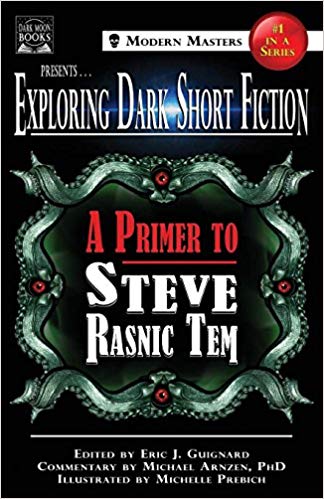Edited By ERIC J. GUIGNARD (Dark Moon Books; 2017)
This is the first in a series of “Exploring Dark Fiction” primers edited by Eric J. Guignard (a talented author of dark fiction in his own right). As the title, A Primer to Steve Rasnic Tem, portends, the subject is Steve Rasnic Tem, six of whose stories are included here, along with a nonfiction piece, an interview, extensive commentary on Tem’s fiction by author/editor Michael Arnzen, and an exhaustive bibliography of Tem’s 400-plus published pieces.
For those unfamiliar with Tem’s work, he’s a justified legend in the horror field who’s best known for his short fiction. Sophisticated and surreal, Tem’s stories give literary horror a good name, although traditionally scary they aren’t–something Tem owns up to in his 1992 essay “The Subject Matter of Horror,” which is included here. In it Tem elaborates on his ideas about what horror is, distinguishing it from emotions like anger, fear and morbidity, which apparently fuel most “unreadable” horror fiction.
In , The six Tem stories, spanning the years 1981 to 2017, amply demonstrate his predilections. First up is “Hungry” from 1992, which wreaks an elegantly gruesome twist on the age-old theme of returning to the womb. “The Last Moments Before Bed” hails from 2013, two years before Tem’s wife Melanie died, and it’s impossible not to see real-life parallels in its melancholy account of a widowed man readying himself for bed—and, it transpires, his death. “The Giveaway,” initially published back in 1981, harkens back to the dark morality tales of old school children’s literature in its account of a girl and her stern father, who runs his household with an iron fist and doles out extremely harsh punishments to anyone who disobeys him.
There’s also 1992’s “Rat Catcher,” about a seriously creepy rat catcher seen from the point of view of a decidedly unreliable narrator, and “Whatever You Want,” a story unique to this volume about a woman who truly gets whatever she wants while Christmas shopping with her bratty child in a haunted mall. “In These Final Days of Sales,” hailing from 2001, is the book’s crown jewel; a magnificently realized bit of sustained surrealism about the final days of a travelling salesman, the story evinces a refined brand of apprehension that, of all the stories collected here, best illustrates Tem’s points in “The Subject Matter of Horror.”
Michael Arnzen’s commentaries on the stories are a bit too academic for my tastes, but intelligent and informative nonetheless. In fact, in his comments on “Rat Catcher,” Arnzen may get to the heart of what truly makes Tem’s fiction memorable in the description of his talent for “making us wonder what is and is not reality—what is and is not dream. Tem reminds us that, in fiction, these boundaries are arbitrary—and sometimes the root of the problem.”

